INSIDE
RACING
T E C H N O L O G Y
Phoenix Start Page
F2000 Page 2
IRT Home
News Page
Contents Page
Newsletter &
Books
email Paul
Formula 2000 at PIR
Uploaded 3/31/99
Phoenix is the first event of 1999 for the U. S. F2000 series. Dan Anderson and Mike Foschi are the guys behind this series and they deserve a lot of credit for getting it going. Most of the emphasis in racing is on the top-level series. That's a mistake! If it weren't for Dan and Mike racers would have one less place to start. The IRL has stepped up as a sponsor of F2000. I don't understand why Ford doesn't put some money into the series. Ford engines (the 2 liter Pinto SOHC engine) are used exclusively.
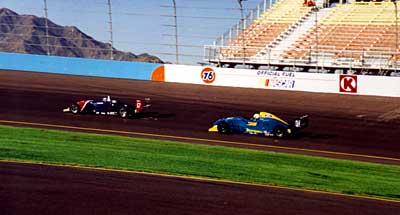
Two F2000 cars in Turn 1. Most of the spins and crashes occurred here. A driver told me the cars are on the absolute edge here and just a throttle lift can move the rear end out. A bump in the middle of Turn 1 has managed to endure through all the track repairs and resurfacing.
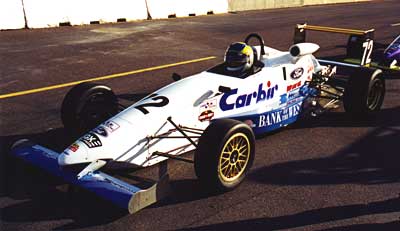
This next series of photos was taken about 10 minutes to 8 am. F2000 practice was the first session every day. It's the lot of a support series to practice early. This is a Carbir. It's made in the U.S. and that's about all I know about it. All the F2000 cars have the water and oil coolers mounted very low in side pods to keep the center of mass low.
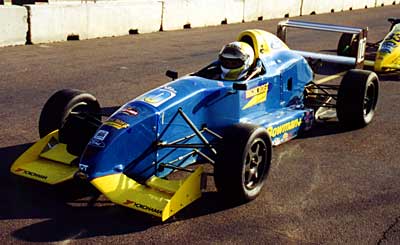
A front view of a Bowman chassis. Notice the high and narrow aero strategy as compared to the Carbir The front wing has a dihedral center section unlike the Carbir. Some aero guys want the air to go around the car so there isn't a large plan-view (horizontal) area for a boundary layer to build up on. If the car is high and narrow it has less plan-view area. The goal is clean air to the rear wing and the top of the diffuser duct. The Carbir looks pretty slick, actually. The Bowman is made in England and was designed by Sergio Rinland, a Formula 1 designer. I'm not sure I spelled his name right.
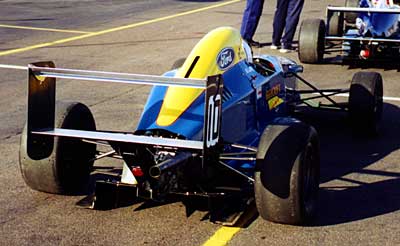
A rear view of the Bowman. All the F2000 cars have a flat bottom with a diffuser. That makes ride height critical and mandates stiff springs. No big deal on an oval I guess. Too bad they can't mount the lower plane of that rear wing a foot or so lower where it could augment diffuser flow.
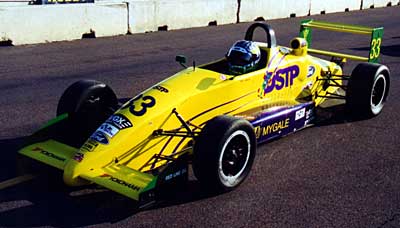
This is a French chassis manufacturer new to F2000, Mygale, pronounced "my gaul." They had a representative at Phoenix but he was a sales guy who didn't know squat about the car. What good is that?
DSP Motorsports manager, Steve Cameron, wouldn't tell me much about the car either. Kiwi, as Steve is known, must think the car is an advantage or he wouldn't mess with it. They did OK at Phoenix, qualifying 10th and 11th and finishing the race in 11th and 14th. The car looked pretty standard to me with pushrod suspension front and rear. But what do I know?
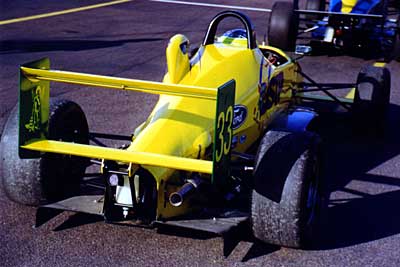
A rear view of the Mygale shows a wider, simpler diffuser than the other cars--no strakes or fences.
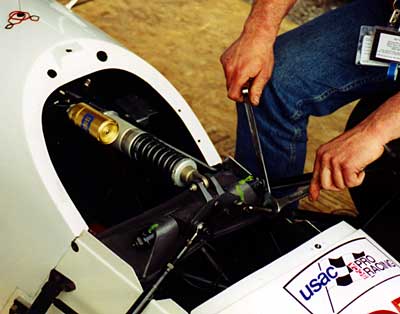
The older Van Diemen chassis sported a monoshock front suspension. Compare the simplicity of this with the Dallara IRL suspensions in the report from the Phoenix CART/IRL test. As I explained in that report forces from the pushrods rotate the link about its shaft (bump) and also want to slide the link laterally (roll) on the shaft. The spring/damper works in bump/rebound only. I think there are coil springs inside the covers at each end of the shaft that provide an adjustable roll stiffness as an anti-sway bar does.